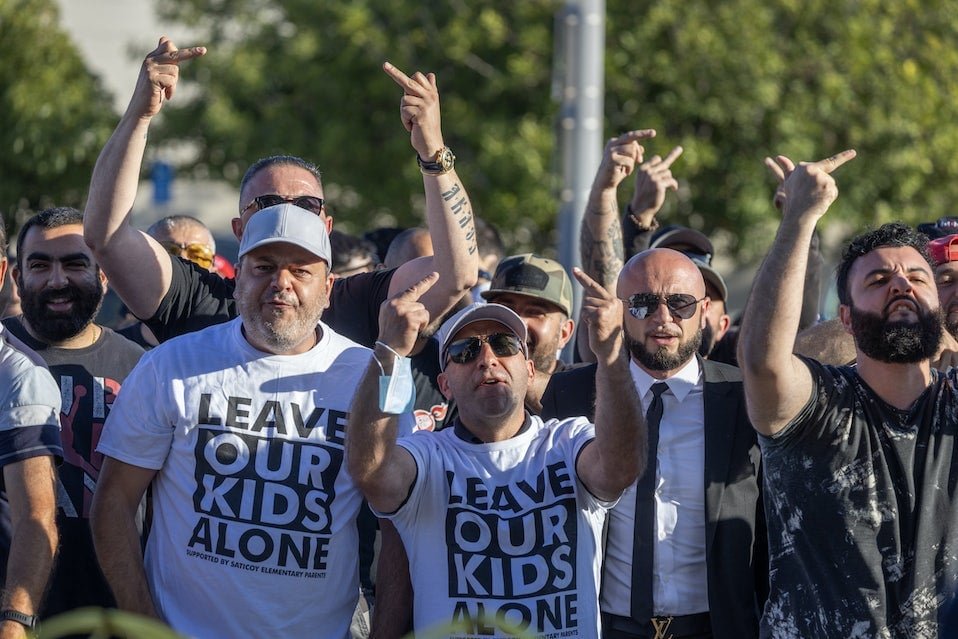The Far Right Is Growing Stronger—and Has a Plan for 2024



Anti-trans demonstrators rallying in Glendale, California, in June of last year. PHOTO BY DAVID MCNEW/GETTY IMAGES
Increasingly ignored by the mainstream, right-wing edgelords are amassing power behind the scenes.
In the last year, the far right has dropped off the radar of many Americans, as issues like the Israel-Hamas war, ongoing concerns about the economy, and the upcoming election have understandably dominated the headlines. The continuing January 6 arrests, trials, and convictions and Trump’s legal issues are mop-ups of crimes from years earlier. And while school board takeovers and drag show disruptions are in the public consciousness, these issues are typically shrouded behind euphemisms like “parents’ rights.”
Another reason for this oversight is because far-right ideas have permeated American politics. Although the alt right collapsed, its goal of shifting the “Overton window”—the spectrum of what is considered legitimate political discourse—succeeded. Today, white supremacist, anti-LGBTQ+, and even antisemitic conspiracy theories have become so prevalent that what was taboo even in 2018 is accepted by many as not only normal but acceptable.
However, observers of the far right are keenly aware of the movement’s continuing strength. For years many hoped the forces unleashed by Trump’s ascent in 2016 would reach a point of sudden collapse, as had happened in the past. These dreams were first pinned on Trump’s election losses (first in 2016 and then in 2020) and then on an expected delegitimization after the January 6, 2021, insurrection. But this has not been the case, and even in the absence of new high-profile events, the far right’s activist base has continued largely unfazed under President Biden. Looking at its organizations and strategies, as well as issues from the past year, shows what it will hit the ground running with as the 2024 presidential campaign heats up.
Donald Trump
Trump remains the far right’s leading figure, commanding a devoted following and remaining the center of news coverage.
Experts who watch the far right are concerned about possible violence if Trump does not become president. David Neiwert, author of The Age of Insurrection, says that although he thinks it is unlikely that Trump will win, if he doesn’t his “hardcore supporters are going to engage in acts of domestic terrorism.” (If he is convicted and sentenced to jail time, Neiwert believes they may even go so far as to “try and break him out” of prison.) Journalist Teddy Wilson, publisher of Radical Reports, is only a little less circumspect, saying that “another mass casualty event” like the 1995 Oklahoma City bombing, which killed 168, is “hanging in the air.” And Professor Amy Cooter, author of Nostalgia, Nationalism, and the US Militia Movement, says she “would not be shocked” by violence following the election—although she hesitates to say it would be a certainty.
If Trump does regain power, the threat he poses is exponentially greater. Wilson says that even those who’ve cooled on him, thanks to his failure to make good on promises like “building the wall,” are excited by his threats of revenge. Trump has already vowed to crown himself dictator (but only on “day one”), take “retribution” against his enemies, “stop the Marxist prosecutors” in the Department of Justice and elsewhere, and put tens of thousands of federal jobs under his direct control.
One of the most worrying recent developments is that what is now called the “MAGA movement,” which emerged in Trump’s wake, is no longer dependent on him. While it follows his politics, it acts politically without him. Its most visible elected politicians are members of Congress, particularly Marjorie Taylor Greene, Lauren Boebert, and Paul Gosar. Of them, Greene has been able to garner the most attention, sharing the spotlight only with Florida Governor Ron DeSantis, who himself is waging a full-throated war against LGTBQ+ people and the state’s educational system. Trump’s ideas on issues like immigration and foreign policy have permeated the Republican Party to such an extent that they have dominated several GOP presidential debates that he himself has not participated in.
The Grassroots
The most popular focus of grassroots political work in 2023 was attacking LGBTQ+ issues, with a particular concentration on transgender rights. Wilson describes this overarching framework as “focused on children” who are being cynically “used to pursue policy goals.” These include the often successful takeovers of school boards, banning of library books (usually featuring LGBTQ+ content), and attempts to shut down drag events, which are claimed to “groom” children. The main organization driving these actions is Moms for Liberty, which was founded in 2021 and has since grown to 285 chapters.
Moms for Liberty has forged close relations with the Proud Boys, who are now notorious after years of wanton street violence, Trump’s pre–January 6 nod to them to “stand back and stand by,” and their subsequent role in storming the Capitol. In fact, the long sentences handed to multiple members for their pivotal role in the insurrection—leader Enrique Tarrio got 22 years—have not stymied their growth. Among other things, the Proud Boys have made significant inroads into local Republican Party structures.
Since January 6, over 1,000 people have been charged for their role in the violent assault on the Capitol, with some receiving stiff sentences. For example, this spring Peter Schwartz—himself not a member of the Proud Boys—received 14 years for attacking Capitol police with a folding chair and pepper spray. While it was hoped that these convictions would halt the far right’s momentum, this hope was quickly dashed as even mainstream Republicans came to the January 6 arrestees’ defense. In fact, Wilson says many of those imprisoned expect Trump to pardon them if he returns to the White House in 2025.

